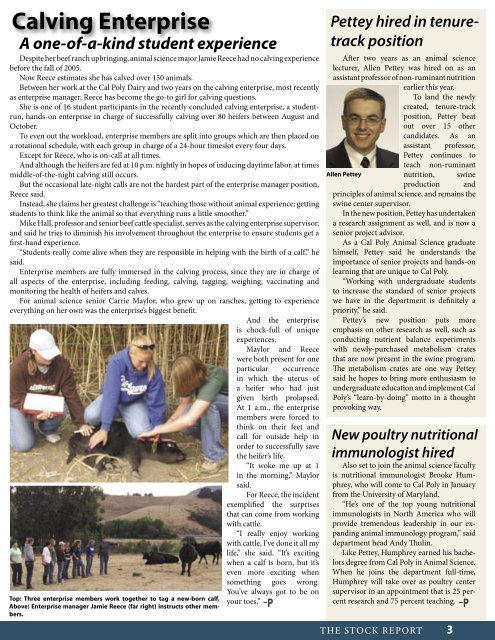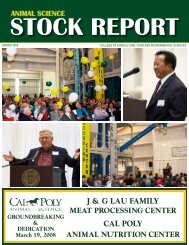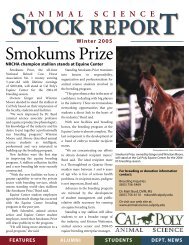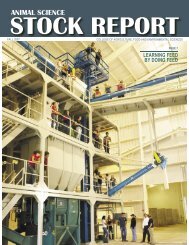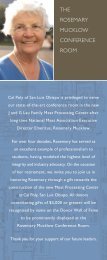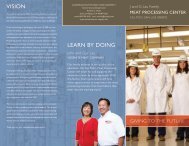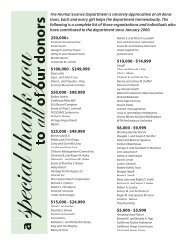Fall 2006 - Animal Science Department
Fall 2006 - Animal Science Department
Fall 2006 - Animal Science Department
You also want an ePaper? Increase the reach of your titles
YUMPU automatically turns print PDFs into web optimized ePapers that Google loves.
Calving Enterprise<br />
A one-of-a-kind student experience<br />
Despite her beef ranch upbringing, animal science major Jamie Reece had no calving experience<br />
before the fall of 2005.<br />
Now Reece estimates she has calved over 150 animals.<br />
Between her work at the Cal Poly Dairy and two years on the calving enterprise, most recently<br />
as enterprise manager, Reece has become the go-to girl for calving questions.<br />
She is one of 16 student participants in the recently concluded calving enterprise, a studentrun,<br />
hands-on enterprise in charge of successfully calving over 80 heifers between August and<br />
October.<br />
To even out the workload, enterprise members are split into groups which are then placed on<br />
a rotational schedule, with each group in charge of a 24-hour timeslot every four days.<br />
Except for Reece, who is on-call at all times.<br />
And although the heifers are fed at 10 p.m. nightly in hopes of inducing daytime labor, at times<br />
middle-of-the-night calving still occurs.<br />
But the occasional late-night calls are not the hardest part of the enterprise manager position,<br />
Reece said.<br />
Instead, she claims her greatest challenge is “teaching those without animal experience; getting<br />
students to think like the animal so that everything runs a little smoother.”<br />
Mike Hall, professor and senior beef cattle specialist, serves as the calving enterprise supervisor,<br />
and said he tries to diminish his involvement throughout the enterprise to ensure students get a<br />
fi rst-hand experience.<br />
“Students really come alive when they are responsible in helping with the birth of a calf,” he<br />
said.<br />
Enterprise members are fully immersed in the calving process, since they are in charge of<br />
all aspects of the enterprise, including feeding, calving, tagging, weighing, vaccinating and<br />
monitoring the health of heifers and calves.<br />
For animal science senior Carrie Maylor, who grew up on ranches, getting to experience<br />
everything on her own was the enterprise’s biggest benefi t.<br />
And the enterprise<br />
is chock-full of unique<br />
experiences.<br />
Maylor and Reece<br />
were both present for one<br />
particular occurrence<br />
in which the uterus of<br />
a heifer who had just<br />
given birth prolapsed.<br />
At 1 a.m., the enterprise<br />
members were forced to<br />
think on their feet and<br />
call for outside help in<br />
order to successfully save<br />
the heifer’s life.<br />
“It woke me up at 1<br />
in the morning,” Maylor<br />
said.<br />
For Reece, the incident<br />
exemplifi ed the surprises<br />
that can come from working<br />
with cattle.<br />
“I really enjoy working<br />
with cattle, I’ve done it all my<br />
life,” she said. “It’s exciting<br />
when a calf is born, but it’s<br />
even more exciting when<br />
something goes wrong.<br />
Top: Three enterprise members work together to tag a new-born calf.<br />
Above: Enterprise manager Jamie Reece (far right) instructs other members.<br />
You’ve always got to be on<br />
your toes.”<br />
Pettey hired in tenuretrack<br />
position<br />
Aft er two years as an animal science<br />
lecturer, Allen Pettey was hired on as an<br />
assistant professor of non-ruminant nutrition<br />
earlier this year.<br />
To land the newly<br />
created, tenure-track<br />
position, Pettey beat<br />
out over 15 other<br />
candidates. As an<br />
assistant professor,<br />
Pettey continues to<br />
teach non-ruminant<br />
Allen Pettey<br />
nutrition, swine<br />
production and<br />
principles of animal science, and remains the<br />
swine center supervisor.<br />
In the new position, Pettey has undertaken<br />
a research assignment as well, and is now a<br />
senior project advisor.<br />
As a Cal Poly <strong>Animal</strong> <strong>Science</strong> graduate<br />
himself, Pettey said he understands the<br />
importance of senior projects and hands-on<br />
learning that are unique to Cal Poly.<br />
“Working with undergraduate students<br />
to increase the standard of senior projects<br />
we have in the department is defi nitely a<br />
priority,” he said.<br />
Pettey’s new position puts more<br />
emphasis on other research as well, such as<br />
conducting nutrient balance experiments<br />
with newly-purchased metabolism crates<br />
that are now present in the swine program.<br />
Th e metabolism crates are one way Pettey<br />
said he hopes to bring more enthusiasm to<br />
undergraduate education and implement Cal<br />
Poly’s “learn-by-doing” motto in a thought<br />
provoking way.<br />
New poultry nutritional<br />
immunologist hired<br />
Also set to join the animal science faculty<br />
is nutritional immunologist Brooke Humphrey,<br />
who will come to Cal Poly in January<br />
from the University of Maryland.<br />
“He’s one of the top young nutritional<br />
immunologists in North America who will<br />
provide tremendous leadership in our expanding<br />
animal immunology program,” said<br />
department head Andy Th ulin.<br />
Like Pettey, Humphrey earned his bachelors<br />
degree from Cal Poly in <strong>Animal</strong> <strong>Science</strong>.<br />
When he joins the department full-time,<br />
Humphrey will take over as poultry center<br />
supervisor in an appointment that is 25 percent<br />
research and 75 percent teaching.<br />
THE STOCK REPORT 3


